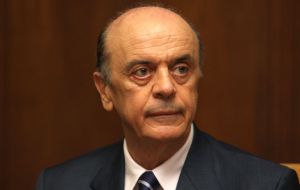MercoPress. South Atlantic News Agency
Dilma riding on Lula da Silva’s popularity but “won’t be enough”
 Sao Paulo governor Jose Serra, the opposition candidate still ahead in public opinion polls
Sao Paulo governor Jose Serra, the opposition candidate still ahead in public opinion polls Former Brazilian President Fernando Henrique Cardoso said that while President Lula da Silva is “unbeatable” today, his popularity won’t be enough to elect his chosen heir, cabinet chief Dilma Rousseff (62).
Speaking to the media in Sao Paulo Cardoso said that Ms Rousseff, the candidate of Lula da Silva’s Workers’ Party, will have to rely on her own performance to beat opposition contender Jose Serra, 67, because in Brazil, “voters choose their president on a candidate’s character and personality, not the party or who supports them”.
“If Lula da Silva were competing no one would be able to defeat him because he has a very strong link with the population” said Cardoso, who like Serra belongs to the Brazilian Social Democracy Party. “Dilma has no leadership; she has no contact with Congress”.
However Lula da Silva’s efforts to bolster Rousseff have caused Serra to slip in polls. The governor of Sao Paulo, who lost to Lula in 2002, “needs to declare his candidacy and begin to campaign aggressively to avoid leaving the field to Rousseff and Lula” warned Cardoso.
Former guerrilla Rousseff, who has never run for office, became the official candidate of the ruing Workers’ Party last February 20. She has been traveling the country with Lula da Silva to gain visibility at events such as the inauguration of public works projects.
From December to February and with eight months to the October 3 presidential election, Serra’s lead over Rousseff has narrowed to four percentage points, down from fourteen points in December, according to a Datafolha poll published February 28 by Folha de Sao Paulo showed.
The Datafolha poll gave Serra the support of 32% of voters and 28% for Rousseff, the newspaper said. The poll was conducted Feb. 24-25 and has a two percentage point margin of error.
Cardoso who defeated Lula da Silva twine in the nineties was first elected in 1994, after implementing as Economy Minister the Plano Real, which tamed 4,922% annual inflation. In 1998 he was reelected in the first round for a second four year-term and adopted the country’s floating exchange rate and inflation targeting that is still in place.
By keeping inflation in line with targets and reducing public debt as a percentage of GDP, Lula da Silva won Brazil’s first investment grade rating in 2008.
Serra, governor of Brazil’s richest and most populous state lost a presidential runoff in October 2002, taking 39% of the vote to Lula’s 61%.




Top Comments
Disclaimer & comment rulesCommenting for this story is now closed.
If you have a Facebook account, become a fan and comment on our Facebook Page!